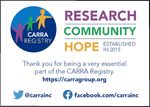STOP-JIA Study Results - Childhood Arthritis and Rheumatology ...
←
→
Page content transcription
If your browser does not render page correctly, please read the page content below
CARRA Registry
Newsletter
CARRA-0219-564
SPRING 2021
STOP-JIA
Study Results
Katherine Murphy, MPH
STOP-JIA Patient Partner
Juvenile idiopathic arthritis, or JIA, is a disease that causes joint
damage, stiffness, and swelling. One of the most common
forms of JIA is polyarticular JIA (pJIA), meaning that it involves
swelling in five or more joints. Left untreated, pJIA can lead to
lead to permanent joint damage, which can cause chronic pain
and disability.
There is no cure for pJIA but there are many treatments
available that work well. The most commonly used medicines to
treat pJIA fall into two major categories. The older, less
expensive, and more widely available medicines are called
disease-modifying antirheumatic drugs (DMARDs). This includes
medicines like methotrexate. The other major category is a
newer class of drugs called biologics that target very specific
parts of the immune system. Examples include etanercept
(Enbrel®), adalimumab (Humira®), and tocilizumab
(Actemra®). Despite having all these treatment options,
providers do not know whether to start with a DMARD, biologic,
or both. The Start Time Optimization of biologics in pJIA (STOP-
JIA) study looks to answer that question.
STOP-JIA is a study that compared the effectiveness of three
commonly-used treatment strategies developed by CARRA:
• Step Up (start treatment with
a DMARD only, then add a
biologic if needed)
• Early Combination (start
555 East Wells Street, Suite 1100 treatment with both a
Milwaukee, WI 53202 DMARD and a biologic)
414-918-9822 • Biologic First (start treatment
carragroup.org with a biologic only)
Article continued on Page 4
PAGE 1 OF 4PAGE 2 OF 4
CARRA Membership Cards—You’re in the Club!
The first time you’ve probably heard of pediatric rheumatic The membership card is a reminder that you are part of a very
diseases was on diagnosis day. You might feel alone because special community. The cards will be sent to all CARRA Registry
pediatric rheumatology diseases are rare. However, you are not sites over the next few months. All people who signed up for the
alone! You are now part of a close-knit community of families Registry can ask their provider for a card at their next clinic visit.
battling these conditions. There are approximately 300,000 Then you can proudly wear it to all future clinic and telehealth
children in the US just like you who were diagnosed with pediatric visits!
rheumatic diseases like JIA, lupus, JDM, scleroderma, and CRMO. To keep up to date with CARRA Research results, current
activities, and to stay in touch, please ask your doctor about re-
Introducing the new CARRA Registry Membership Card! The card consenting in the CARRA Registry today!
was created for everyone who signed up to be in the CARRA
Registry. There are over 11,000 children diagnosed with
rheumatic diseases who are in the CARRA Registry. Information
collected in the Registry can answer important questions about
how safe medicines are, how well medicines work, and how well
children do over time. CARRA will collect this information for at
least 10 years.
Advice for Transitioning
from Pediatric to Adult
Rheumatology
Authored by: Missy Skolnik,
21-year Linear Scleroderma Veteran Patient
If you are thinking about stopping regular visits with your pediatric rheumatologist because you’re aging out, or because you’re in
remission - be aware - it’s tough to urgently establish yourself as a new patient if you “fall out of care” for more than two years! It
may take longer than ideal to be seen if you are worried about a potential flare or begin treatment to halt disease progression.
My symptoms growing up were contained to my left extremities. I was in remission for more than 10 years, yet at age 22, it took
months of denial, ignoring a deep crack on my tongue which compromised its strength and mobility, to connect the dots.
When you’re aging out of treatment with a pediatric rheumatologist, ask for an adult rheumatologist referral and “shop around”
to find the right fit before you need it. Find someone you’re comfortable with, who’ll respect you, trust what you’re saying, and
treat you with meds you’ve come to rely on (this should be an explicit conversation the first time you meet with your new doc).
Find someone with experience treating patients with your exact diagnosis, who’s willing to speak with your pediatric
rheumatologist to understand your medical and treatment history, who’ll use a patient portal and be responsive when you send
messages, and ideally, who takes your insurance. Have a plan for what to do if you start feeling symptoms, even if they appear to
be unrelated.
Finally, if you’re a kid with scleroderma, please get involved in this community. Get to know others like you, join a registry, and
follow up with the registry to give updates over time on your rare, and valuable disease. It is up to us. Twenty-one years into
having this disease, I can assure you - there won’t be a cure or improved treatment options until we all work together at this.
Onward, together.
To read more about Missy’s experience, click here for her storyPAGE 3 OF 4
CARRA Registry Enrolls over 200 JDM Patients!
Why are children with JDM being enrolled in the CARRA Registry?
JDM Committee Chair Dr. Adam Huber explains the goal for JDM in
the Registry is to have a lot of information collected to make it easy
to do many different kinds of research, that are not typically
possible since JDM is so rare. As of February 5, 2021, there are 230
children with JDM in the CARRA Registry! That is over a 30%
increase from 2020 which is amazing considering the pandemic
forced many sites to pause enrollment and many clinic visits had to
What is the biggest challenge for JDM in the CARRA Registry?
be cancelled. The first child with JDM enrolled in the Registry in
The biggest challenge is getting patients enrolled as early as possible
February 2018.
into the CARRA Registry. There is a lot going on when children are first
What can you learn about JDM? diagnosed with JDM, and the doctors and families often have a hard
With the Registry, we can learn more about illness features, how time thinking about research when there is so much going on so early
JDM changes over time, and how children do on their treatment. in the diagnosis.
We want to be able to predict which children are at high risk for
In addition, there is the challenge of collecting all the information for
bad outcomes and which children will have mild JDM, as well as
the CARRA Registry. We need information about muscle disease
which patients will reach full remission. Being able to predict these
(CMAS-Childhood Myositis Assessment Scale and MMT-Manual Muscle
things will allow us to better personalize treatment for each child.
Testing) and skin disease (CDASI-Cutaneous Disease Area and Severity
The goal is to get the right medicine to the right child at the right
Index) which is hard to do when children are very young or very sick.
time and to minimize side effects of therapy.
Sometimes it’s because the clinic staff is very busy or the family does
How can you learn which children will have mild JDM? not have time. The best way for families to help is to remind the clinic
One way we hope to learn this through biosamples and lab based staff to collect this information and be aware that the appointment
research. Thanks to funding by Cure JM, the CARRA Registry is also might take some extra time. CARRA members and families are also
collecting biosamples from children with JDM. Biosamples are working on ways for families to collect some of this information at
samples such as blood, saliva, and urine that come from the home before the clinic visit.
patient. Currently there are 79 samples collected from children
Where can I learn more about the CARRA Registry?
with JDM! Having biosamples allows researchers to better
Visit https://carragroup.org/patients-families/registry to learn more
understand the cause of JDM, how the immune system interacts
about the CARRA Registry. You can view past Registry Newsletters and
with genetics, and how the condition will progress. By linking
sign up to automatically receive new issues by visiting https://
biosamples to CARRA Registry information we can begin to
carragroup.org/research-registry/registry-newsletter. You can also ask
understand which treatments will work best for each person’s
your doctor about the CARRA Registry.
biology.
Spotlight:
Adam Huber, M.D.
Q&A:
Site: IWK Health Centre and Dalhousie University in
Halifax, Nova Scotia, Canada
Role: Chair JDM Committee
Favorite Season: Fall
Research Area of Special Interest:
Assessment and Outcomes in JDM Favorite Animal: my dog (or Red Pandas)
Favorite Movie: Princess Bride (really) Favorite Color: Red
Favorite TV Show: The Mandalorian Book you’re reading: A Hero Born and Indigenous
Relations:Insights, Tips and Suggestions to Make
Favorite Hobby: Golf Reconciliation a Reality
Favorite Food: Spicy Thai Noodles Favorite Quote: "Do or do not, there is no try"Logan Lentini, Research Coordinator:
Logan Lentini is a Research Coordinator for the University of Florida College
of Medicine, who works on the CARRA Registry with the Division of Pediatric
Allergy, Immunology, and Rheumatology. He started his work at the
University of Florida CARRA Registry site as an undergraduate research
assistant in the Fall of 2016. Logan graduated from the University in 2019
and has continued to play a key role in the success of the Registry. With his
help, UF has become the 4th highest enrolling site, and the top site
collecting biosamples in the CARRA Registry. To date, Logan has worked on 5
CARRA sub-studies within the Registry and 1 drug study.
Logan also has a personal connection to the CARRA Registry. In 2010, his
younger brother, Parker, was diagnosed with polyarticular juvenile idiopathic
arthritis. Since then, his diagnosis has evolved to systemic juvenile idiopathic
arthritis. Watching Parker live with arthritis for the last decade has inspired
Logan to act; he has volunteered extensively with the Arthritis Foundation,
fronted sibling support groups at national Juvenile Arthritis Conferences,
and, of course, worked on the CARRA Registry. Logan plans to enroll into PA
school in the future so that he can continue to help children with chronic
illnesses.
STOP-JIA Study Results, Continued
Medicines were changed or added for any STOP-JIA Results: In all three treatment groups, patients had less
patients whose symptoms didn’t get better • 400 children with pJIA patients pain and greater mobility after one year.
after three months. enrolled across 56 clinics in the However, less than half of the patients in the
United States study had complete disease control. In addition,
The STOP-JIA research team enrolled patients • 291 (72.8%) of the children levels of active inflammation in joints were not
with pJIA before they started treatment. The identified themselves as white, 30 very different in each of the treatment groups at
choice of treatment was made by the (7.5%) of the children identified as 12 months, but the Early Combination group
provider, patient, and family based on what black, and 79 (19.8%) identified as responded faster when compared to those in the
they thought was best. Once enrolled, another race. Step Up and Biologic First groups.
patients and their families were asked to visit • The average age of patients in the
the doctor every three months for 1 year at study was 10 and 292 (73%) were STOP-JIA is the largest study of its kind in the
which time they filled out surveys about their girls. history of pediatric rheumatology. Becoming
disease. • 256 (64%) chose Step Up, 100 (25%) symptom free within just 1 year after pJIA starts
Early Combination, and 44 (11%) is hard to achieve. Fortunately, children who
Biologic First enrolled in STOP-JIA also enrolled in the CARRA
Registry. They will continue to be followed for
10+ years which will allow us to learn which plan
CARRA is grateful to the following organizations for their financial is best over a long period of time. Stay tuned for
updates from the STOP-JIA team as they learn
support which makes the CARRA Registry possible:
more.
We want to hear from you!
Send feedback and make
suggestions for future newsletter
topics by contacting
Vincent Del Gaizo
(vdelgaizo@carragroup.org)
Centers for Disease Control and Prevention
NIH's National Institute of Arthritis and Musculoskeletal and Skin Diseases Patient-
or Melanie Kohlheim
Centered Outcomes Research Institute Rheumatology Research Foundation (mkohlheim@carragroup.org).
PAGE 4 OF 4You can also read



























































